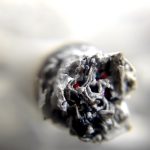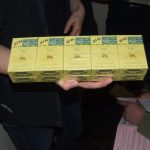The problem
Tobacco use is the leading cause of preventable death and disease globally. It leads to tens of thousands of avoidable deaths every year in England and causes many more people to lose years of active life through smoking-related illnesses.
All forms of tobacco are harmful – cigarettes, hand-rolling tobacco, niche tobacco – and regardless of whether it was bought from an illegal or legal source, up to two in three long-term tobacco users will die early as a result of smoking.
What is illegal tobacco?
Illegal tobacco can take many different forms and there can be regional variations in the terms used. These are the definitions that are generally understood by health and enforcement partners:

Hand-rolling tobacco
Illegal tobacco can take many different forms and there can be regional variations in the terms used. These are the definitions that are generally understood by health and enforcement partners
- Illicit whites: tobacco products with no legal market in the UK, often from Eastern Europe
- Non-UK duty paid: tobacco products that are smuggled into the country and sold without the correct duties being paid
- Counterfeit or fakes: illegally-manufactured tobacco products that are made to look like recognised brands.

Cigarettes
- “Illicit white” cigarettes which have no legal market in the UK. These are cigarettes legally mass manufactured in factories and imported illegally to the UK. Duty has not been paid and the appropriate health warnings and images might not be present.
- Counterfeit cigarettes which are illegally manufactured and sold by a party other than the original trademark or copyright holder.
- Genuine cigarettes which are smuggled into the UK without duty paid. Tobacco companies themselves have been strongly implicated in this. As well as cigarettes made for the UK this may include cigarettes intended for sale in another country that have been smuggled into the UK or duty free cigarettes being illegally sold, rather than kept for personal use.

Undermining efforts to cut smoking
Increasing tobacco prices is the number one policy lever to encourage smokers to quit and to discourage young people – who are particularly price sensitive – to start smoking. The illegal trade undermines all of this. In the UK, progress has been made in recent years to reduce smoking rates to their lowest level yet. However, the existence of an illicit trade in tobacco products reduces the effectiveness of tobacco control measures because:
- Illicit tobacco is often available at cheaper prices, undermining the effectiveness of taxation, making it harder for smokers to quit. Cheap tobacco also makes it easier for non-smokers to start and ex-smokers to relapse.
- Illegal tobacco is available from a range of sources within some local communities, making it easier for children to start smoking and enabling them to become hooked at a young age.
- The illicit tobacco trade is often part of organised criminal activity and is linked to a range of other illegal trades including alcohol and DVD production, people-trafficking and drug smuggling. There is also evidence to suggest that the illicit tobacco trade funds terrorism. Fortunately, over time and with continued investment, this problem is reducing.
Data from HM Revenue & Customs show a long-term, sustained decline in the size of the illicit tobacco market since 2000, which is backed up by research carried out in a number of English regions. However, efforts must be sustained in order to continue this downward trend.
The tobacco industry involvement in tobacco smuggling
Tobacco smuggling increased in the 1990s due to a vast expansion in British cigarettes being sold overseas in bulk which were destined to be smuggled straight back to the UK – with tobacco manufacturers benefitting from the increase in sales of their products at a cheaper tax-free price. During a UK Parliament’s Public Accounts Committee hearing on the illicit tobacco trade in 2002, George Osborne MP addressed the Chief Executive of Imperial Tobacco:
“One comes to the conclusion that you are either crooks or you are stupid, and you do not look very stupid. How can you possibly have sold cigarettes to Latvia, Kaliningrad, Afghanistan and Moldova in the expectation that those were just going to be used by the indigenous population or exported legitimately to neighbouring countries and not in the expectation they would be smuggled?”
It is also in the tobacco companies’ interests to exaggerate the size of the illicit tobacco market, primarily to oppose or delay the introduction of further tobacco control measures and to promote their image as ‘responsible manufacturers’. Despite independent data showing that the market is reducing, tobacco industry-generated data continues to suggest that the market is growing rapidly. Tobacco industry surveys rarely represent a true picture of the market and have been widely criticised.
For further information on tobacco companies and smuggling see:
- Tobacco tactics, an online resource providing up to date information on the tobacco industry
- A critique of a report into the illegal tobacco trade commissioned by Philip Morris International: Towards a greater understanding of the illegal tobacco trade in Europe: a review of the PMI funded ‘Project Star’ report
- An analysis of tobacco industry manipulation of illegal tobacco figures by the University of Bath: Tobacco industry manipulation of data on and press coverage of the illicit tobacco trade in the UK
- A study of the trends in cheap tobacco use among adult smokers in the UK between 2002-2014 via changes in product type, purchase source and prices paid: Availability and use of cheap tobacco in the UK 2002-2014: findings from the International Tobacco Control Project.
